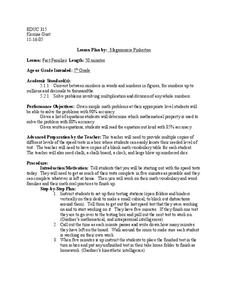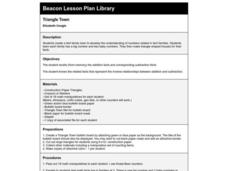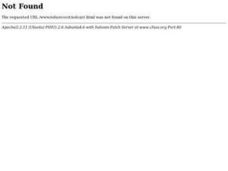Curated OER
Surprising Facts About Life 50 Years Ago
Students research a specific time period and look for interesting facts about that time. They compile a list of these facts and share what they find by creating a class book or bulletin board.
Curated OER
Fact Families
Fifth graders explore fact families. They solve simple math problems. Students determine which mathematical property is used to solve the given problem. They are given five minutes to complete as many mathematical facts as possible.
Prestwick House
Understanding Language: Slant, Spin, and Bias in the News
We live in a time of fake news, alternative realities, and media bias. What could be more timely than an activity that asks class members to research how different sources report the same topic in the news?
Curated OER
Triangle Town
Second graders create a fact family town to develop the understanding of numbers related in fact families. They learn each family has a big number and two baby numbers. They make triangle shaped houses for their facts.
Curated OER
Writing to Persuade
Middle schoolers discover effective writing techniques to create persuasive essays. In this writing lesson, students investigate ways to express facts and points of view through persuasive essays. Finally, the middle schoolers write...
Curated OER
Ellis Island/Angel Island
Fourth graders research Ellis Island and Angel Island. In this library media instructional activity, 4th graders use resources from the library to locate facts about Ellis Island and Angel Island. Students construct a Venn diagram to...
Curated OER
Harriet Tubman Integrated Unit
Students organize facts about Harriet Tubman. In this writing instructional activity, students research Harriet Tubman, sort facts about her into two categories, and use the information they have found to write about her life in complete...
Curated OER
A Is For America
Students listen to the story A Is For America and make predictions before reading and recall details after reading. In this America lesson plan, students listen to this story and learn important facts about America.
Curated OER
George Washington Bingo
Students identify significant contributions of George Washington. In this reviewing facts about George Washington lesson, students cut and paste a list of words from the "Clues and Answers" worksheet to make a Bingo card, listen to the...
Curated OER
Deserts: How Do You Define One?
Second graders identify what constitutes as a desert by reading a habitat checklist. In this environment lesson, 2nd graders read a nature website to discover facts about the desert and where they are located. Students...
Curated OER
Introducing Powers and Models II: Multiplication Rummy
Learners practice their multiplication table using a game to increase speed and accuracy. In this multiplication activity, students distribute 5 random number cards to each player (2-5 players) and they "play" if their hand includes 3...
Curated OER
Doubles Plus One Math Game
Students participate in a dice game. In this doubles lesson, students are paired up and use dice to create double facts. Students solve the equations.
Curated OER
All About Circles Post Test
In this geometry worksheet, students answer ten multiple choice facts about circles. The questions include finding the diameter, area, and radius of a circle.
Curated OER
Weather Facts
Students study weather and weather measurement tools. In this weather lesson, students read and discuss weather myths and superstitions as well as weather terminology. Students then work in groups to complete weather stations for wind,...
Curated OER
What's important? Knowing your facts, yourself and your role models
Third graders review safety rules about alcohol, tobacco and medicines. They learn healthy alternatives to using alcohol, tobacco and medicines. They recognize healthy and unhealthy choices
Curated OER
Where's the Beef - Beef Facts or Hype, Is it Bad for You?
Analyze a Happy Meal™ for nutrient content and calories. Blend the contents into "McMush" and use Biuret's solution to test for protein content. There are a few problems with the lesson plan: the resource links are no longer...
Curated OER
Fact or Hoax? You Decide.
Students analyze the components of debating and practice what they have learned as they conduct a class debate on the lunar landing. Both sides of the issue are researched and presented to the group.
Teach Engineering
Fairly Fundamental Facts About Forces and Structures
Don't twist and turn looking for a resource. The first installment of a six-part series teaches young engineers about the five fundamental forces of compression, tension, shear, bending, and torsion. These forces help explain different...
Curated OER
Food Safety-Consumers Need the Facts
High schoolers begin by completing a survey asking them to rank their concerns about commercially prepared foods. They develop a definition of relative risk, and complete the "Pro or Con" worksheet. Students work in groups to make a...
Curated OER
Graphing the Facts
Middle schoolers investigate the correlation between our planet's weather and solar activity. They analyze and discuss data regarding the solar activity cycle, graph annual precipitation and temperature averages over a period of 100...
Curated OER
Recycling: The Way to Save...Fad or Fact
Students write stories about recycling and illustrate them. They examine various containers and determine whether or not they are recyclable. They make a chart about the containers and visit a recycling center.
Curated OER
Active Reading with American History
Explore connections within and between informational texts with this activity about encyclopedia articles. Middle schoolers write encyclopedia articles focusing on topics in American history. They discuss how to determine credibility...
Curated OER
Rudyard Kipling's Rikki-Tikki-Tavi: Mixing Words and Pictures
Create meaningful illustrations to accompany stories in a web-based art and literacy lesson focused on "Rikki-Tikki-Tavi" by Rudyard Kipling. The class takes a virtual art safari with the Museum of Modern Art and then discusses how...
Curated OER
"I" Witness to History
Young journalists write diary entries from the point of view of a person involved in a historical event. They focus on including facts, clear narration, and accurate description of the individual's feelings.























